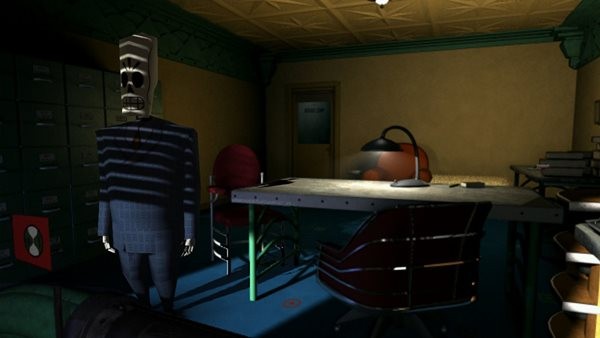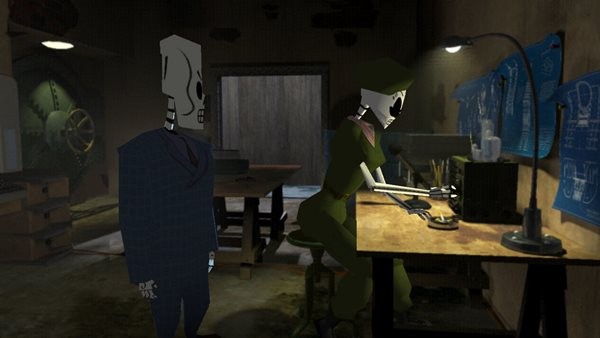Also On: PS4, PC
Publisher: Double Fine Productions
Developer: Double Fine Productions
Medium: Digital
Players: 1
Online: No
ESRB: T
Observation #1 about Grim Fandango Remastered: its status as one of the best games ever is very well-deserved.
Observation #2 about Grim Fandango Remastered: it hasn’t aged tremendously well.
It’s kind of hard to square those two observations, I know, but I’m going to try and do my best. First, the easy part: explaining why this game is so beloved. Because really, it’s not hard to see why. It’s set in a distinctive world, full of memorable characters and colourful settings. The world’s mythology and internal logic has been thought out, and as outlandish as it all is, it nonetheless feels believable — at least to the extent that a game about a Grim Reaper-slash-travel agent living in the Land of the Dead can be believable.
Most importantly, though, the script is genuinely hilarious. There are very few games that do “funny” well, but Grim Fandango is undeniably one of them. The dialogue sparkles with wit, and you never feel as though Tim Schafer and co. were pandering or being too clever for their own good. Like, say, Portal, Grim Fandango is confident enough to tell jokes and not feel as though it needs to hit you over the head with them. That it can do all that is impressive; that it can remain fresh and funny nearly two decades after the fact is mind-boggling. I mean, I love old movies, but a lot of what once passed for humour is cringe-worthy nowadays. 1998 may not be that long ago, but it’s still a fair amount of time, so for a game not to show its age in that respect is a pretty incredible achievement.
Particularly since, in terms of gameplay, Grim Fandango Remastered does feel like a relic from another age. As others have pointed out, the adventure genre is nowhere near as popular now as it was when the game first came out. Tropes that I assume people took for granted back then are definitely not common knowledge now, which means that however intuitive this game may have seemed back in 1998, that certainly isn’t the case today. The puzzles here are extremely challenging and require lots and lots and lots of feeling out, to the point that I imagine only the most masochistic people will be willing (or able) to tackle the game without the help of a very thorough walkthrough. In fact, I’m not going to lie: even with the help of one, I still found myself having to backtrack and redo parts.
You also notice the game’s age when it comes to lots of other areas, too. Take something as simple as character movement: the main character generally moves pretty slowly, and he often has pretty sizeable distances to traverse. Considering this is a game that expects you to backtrack pretty frequently, that can grow pretty tiresome. It’s not helped by the fact the camera is a little finicky and prone to weird angles. It’s something you quickly learn to get over, but that doesn’t make it any less annoying when you’re walking along and suddenly the camera switches on you, forcing you to figure out which direction is which. Even the save system feels old-fashioned: there’s no autosave, and I found that the game really chugs when you go and manually save your spot. In fact, the whole game crashed the first time I tried to save, which definitely made me feel a little tense every time I did that thereafter. (Though I’ll hasten to add that a patch seems to have fixed things in this area substantially.)
Despite my complaints, however, I can’t help but love Grim Fandango Remastered. While issues certainly exist, for the most part it’s a matter of just adapting to a different style of play, not overcoming insurmountable design flaws. If this were a lesser game, to be sure, adapting might not be worth it, but when the upside is getting to play one of the best games ever, it’s a sacrifice I’m more than willing to make.



